The $44,000 Chevy Bolt versus the $44,000 Nissan Leaf: A battle of mass-market electric hatchbacks
Matthew DeBord

- I compared a 2020 $44,000 Chevy Bolt EV Premium and a 2019 $44,000 Nissan Leaf SL Plus.
- Both vehicles are Euro-style hatchbacks offering over 200 miles of range per charge.
- The Leaf has been around since 2010, while the Bolt arrived in 2016.
- The Bolt and Leaf are very evenly matched — but the Chevy's greater range and better technology gave it the upper hand on the Nissan's build-quality.
- Visit Business Insider's homepage for more stories.
In the electric-vehicle marketplace, there aren't that many straight-up comparisons to be made. Tesla's vehicles span several segments and price strata — from SUVs to midsize sedans, from outright luxury cars to vehicles that sticker like upper-level mass-market rides. But Tesla doesn't sell an entry-level hatchback (it does have the Model Y crossover).
Meanwhile, EVs from Jaguar, Audi, and Porsche are aiming for the more well-heeled buyer.
Hyundai and Kia are making mass-market efforts, but we haven't tested any of their offerings.
That leaves us with the Chevy Bolt EV and the Nissan Leaf Plus — which, luckily, match up almost perfectly in terms of specs, dimensions, and amenities. Not to mention pricing.
In 2019, we tested the Leaf, and this year, I sampled the upgraded Chevy Bolt. These are both vehicles I've always liked and had driven on numerous occasions since their respective introductions in 2010 and 2016.
So it's comparison time! Read on to learn which took the crown:
Read the original article on Business InsiderBut the updated Chevy Bolt takes it!

The Chevy Bolt wins this comparison contest for three reasons: range, technology, and the less tangible aspect of taking the competition to Tesla.
The Nissan Leaf Plus is a fine EV, make no mistake. But we are talking about a car that's been around since before Tesla launched its Model S sedan. For much of its existence, the Leaf has been a shorter-range, less-exciting Tesla alternative. It lacked the ambition that the Bolt expressed when it burst onto the scene in 2015.
With 214 miles of range, the Leaf Plus is a notable improvement over previous versions. But the Bolt, in upgraded form, jumped from 240 miles of range to 260, putting even more distance between its somewhat homely hatchback form and the Leaf's ... somewhat homely hatchback form.
Both the Leaf SL Plus and the Bolt EV Premier I tested were priced at $44,000, so I was able to do a straight-up, apples-to-apples comparo: hatch vs. hatch, 62-kWh battery pack vs. 66-kWh, regen braking and single-pedal-driving vs. a regen paddle, front-wheel-driver vs. front-wheel-drive, and so on. (Both vehicles also remain eligible for a full $7,500 US federal EV tax credit.)
The Leaf is, and always had been, a more solidly-built vehicle. In some respects, the Bolt reminds me of the old Honda Fit EV, in that it feels spry compared to the Leaf's hunkered-down-ness. But that's also because the Bolt isn't a robustly bolted together.
So the Bolt loses points for advertising its econo-hatch origins. But Bolt also has a notably better infotainment set-up, superior connectivity, and it's tough to argue that the Bolt didn't beat the Tesla Model 3 to market — because it did, in 2016, by a full year (the Model 3 arrived in 2017 and didn't ramp up deliveries until 2018).
In that sense, while the Leaf was an important all-electric vehicle, simply by virtue of being an early-comer to the party, the Bolt was the perhaps most important vehicle GM has ever produced, defining the century-old automaker's new destiny: EVs, EVs, and more EVs. Post-Bolt, GM intends to launch 22 electric vehicles by 2023.
From a consumer point of view, you can't go wrong with either a Leaf Plus or a upgraded, 2020 Bolt. But the Bolt is a smidge better.
The Leaf Plus is ... more Leaf-y goodness!

Electric cars aren't cheap, although you can pick up a used Leaf from the previous generation for around $10,000. But if you have the means and are serious about making the transition from fossil fuels to EEE-lec-tricity for propulsion, the Leaf Plus's 226-miles range could flip your switch.
The 6.5-second 0-60 mph should also flip your switch. That's darn quick, for a car that outwardly resembles something you'd find parked on the streets of Paris and used mainly for baguette runs. My beef with the Leaf, compared to other EVs is that it feels solid yet sluggish. Against the Bolt, the old, shorter-range Leaf seemed to lack snap.
But the larger battery and more peppy motors have made the Leaf Plus feel downright sporty. My test car also included a suite of driver-assist and semi-self-driving features (Nissan's ProPilot, for example, which can handle steering assist), so the Leaf has become a rather complete package that, for $44,000 as tested, was genuinely packed with content.
Storage is good, about what you'd expect from a hatchback in this segment.
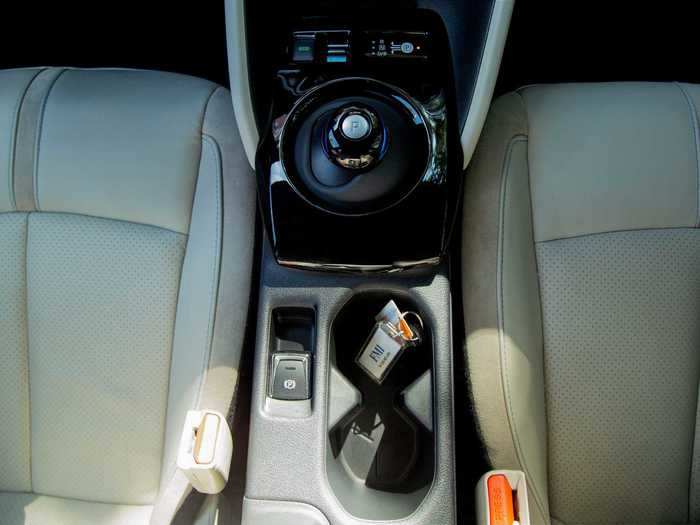
The Leaf's nod to space-age-ness is its round, puck-like toggle shifter.
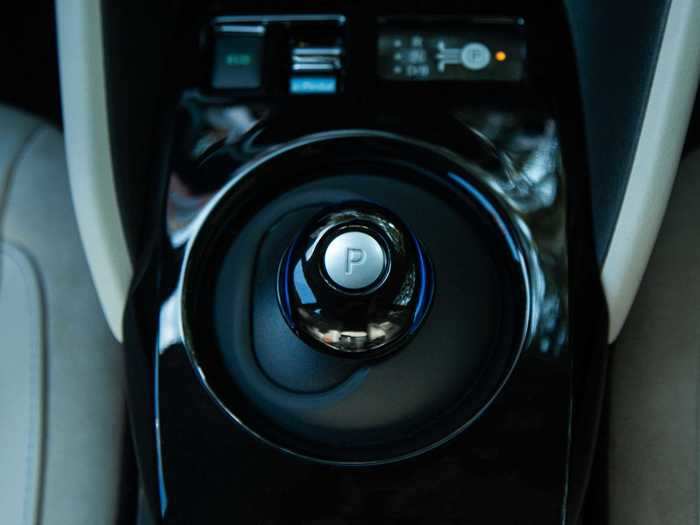
Compared to the Bolt's industry-standard infotainment, the Leaf's is lacking.
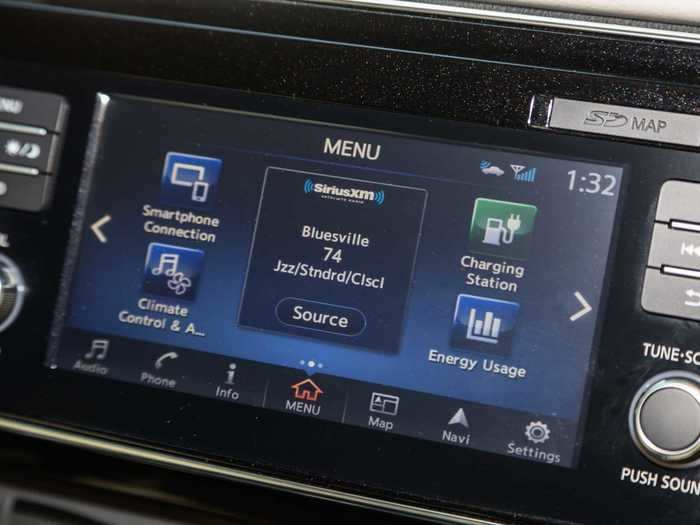
The Leaf's eight-inch color infotainment display looks good, but we aren't the biggest fans of the system's layout. It is easy to use, and Bluetooth device-pairing is a snap. You also have available Apple CarPlay and Android Auto.
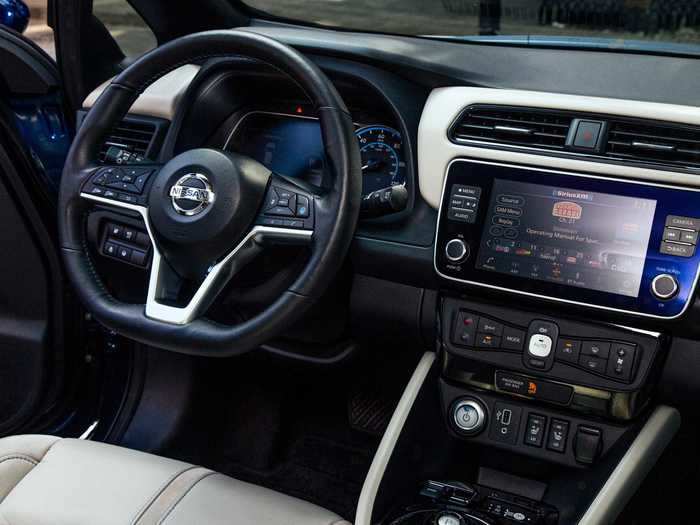
The Leaf has always received criticism for its "tweener" nature. It's not a luxury car, but it's also not bare-bones. I've always thought it hits a sweet-spot for customers who aren't wealthy but who have the means to invest in an EV.
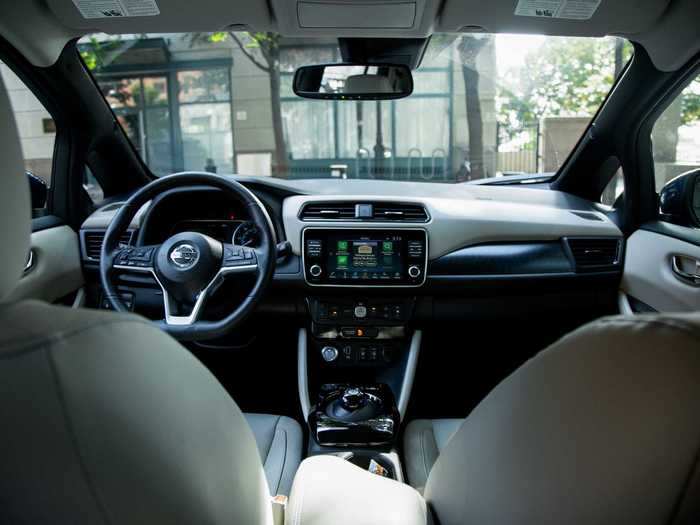
The back seat was about average, space-wise, for the segment.
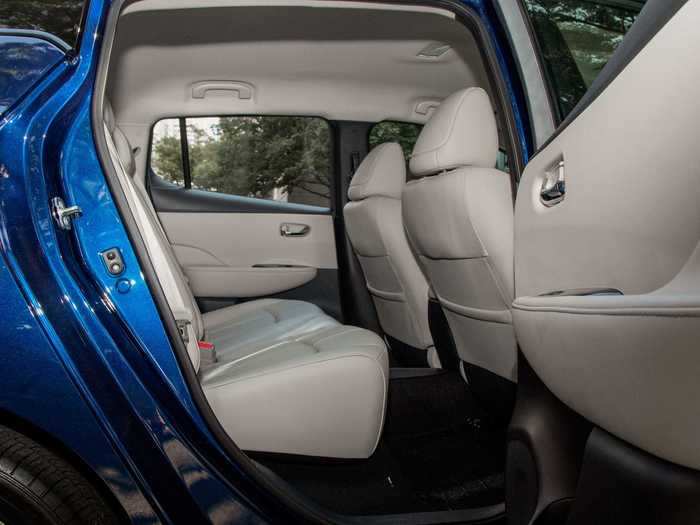
The Leaf's "Light Gray" interior was pleasant. It was a bit shy of premium, but the seats were comfy, and there was a reasonable amount of space to stow small items.
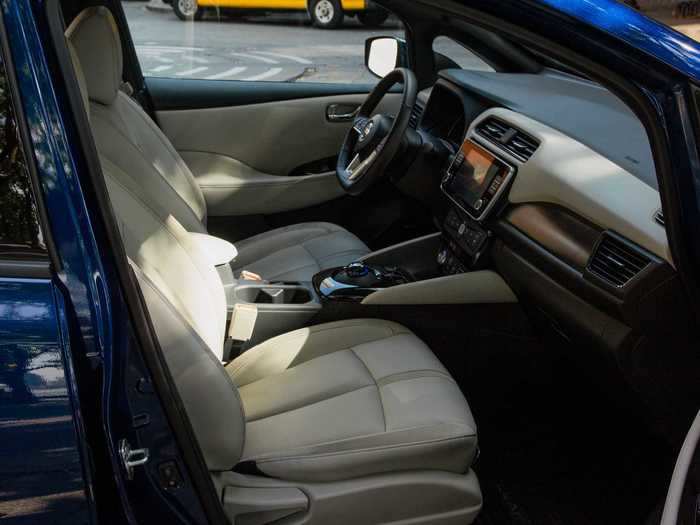
The Leaf has regenerative braking. And when the e-Pedal feature is engaged, it's possible to drive the car using motor braking almost alone, putting power back into the battery.
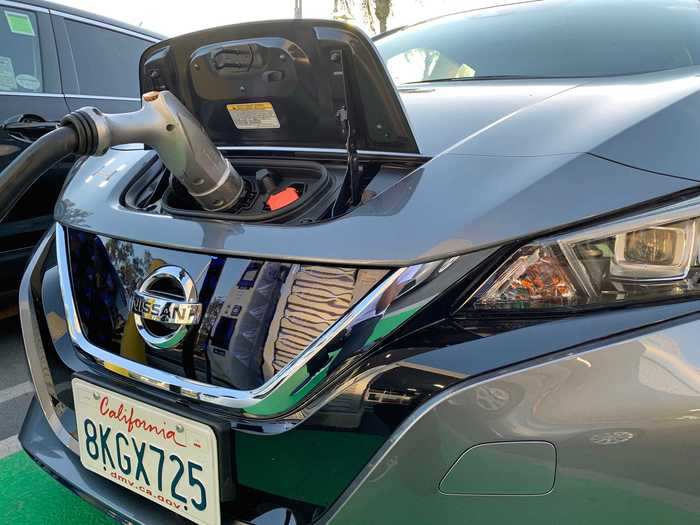
We used the ChargePoint network and did fine with two rounds of 240V charging over the course of a week. It's also possible to install your own 240V ChargePoint unit at home; one can be purchased for about $500, with installation handled by a qualified electrician.
We also used the Nissan Connect iPhone app to monitor charging and to manage climate control and vehicle diagnostics.
[Please note that the photo is of a Leaf SV Plus that we tested in California.]
There's also an onboard charge cable for "trickle" top-offs using a regular wall outlet for 120V power. Using 240V, the Leaf Plus is back to 100% in 11.5 hours. Fast DC charging, however, can achieve 80% in 45 minutes.
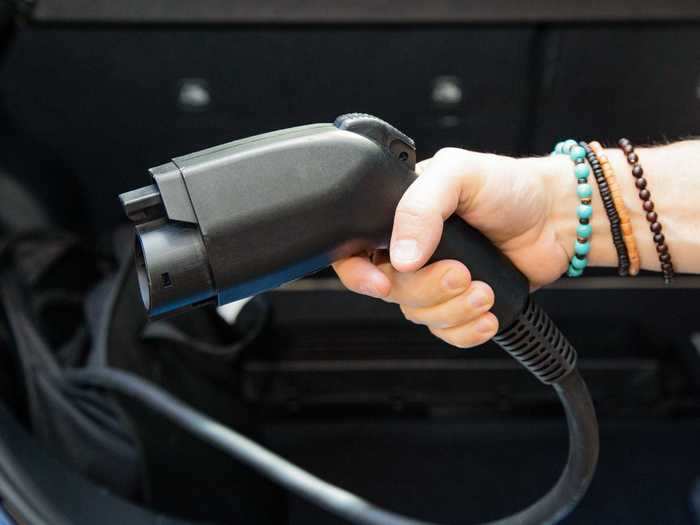
Charging is unchanged from the Leaf we tested in 2018, at least as far as the ports go. There are two, one for 240V "Level 2" charging and one for fast DC charging. Our Leaf SL Plus had a 160 kWh electric motor, making a juicy 214 horsepower with 250 pound-feet of torque.
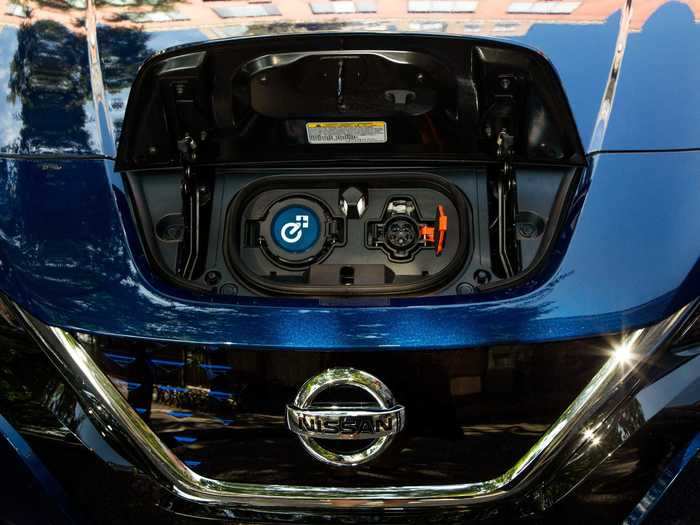
The Leaf's cargo area is an excellent 24 cubic feet, expandable to 30 with the rear seats dropped. The hatch's opening is a tad awkward, with a sort of oval shape.
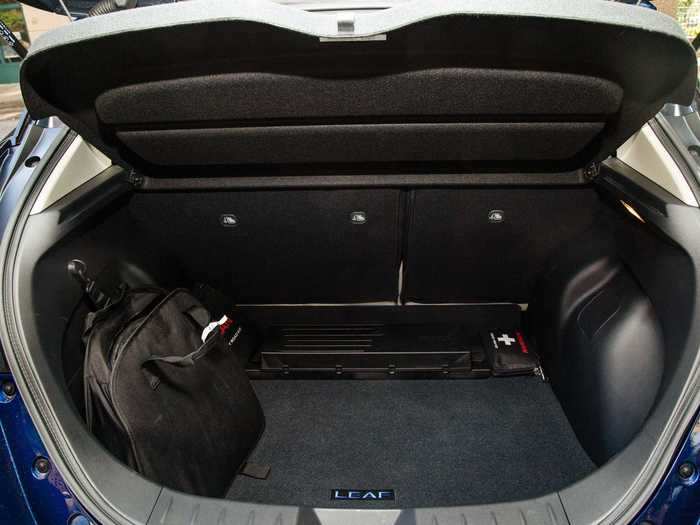
... That perhaps has turned off some US customers, who have basically abandoned small vehicles in favor of large SUVs and pickups.
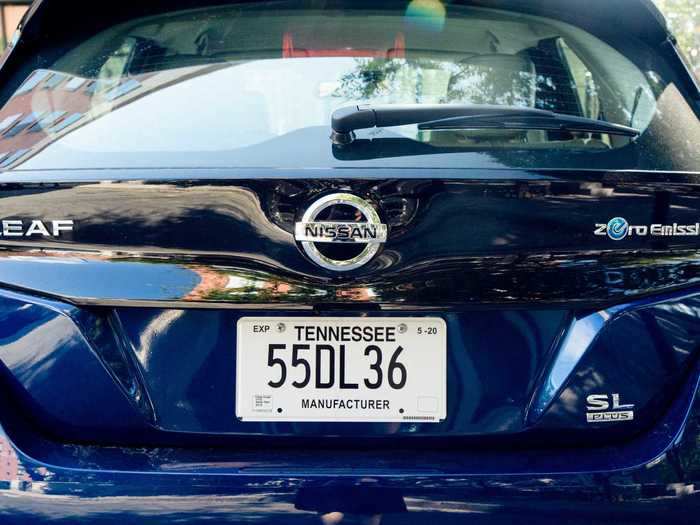
Overall, the Leaf projects a fairly European identity, and ...
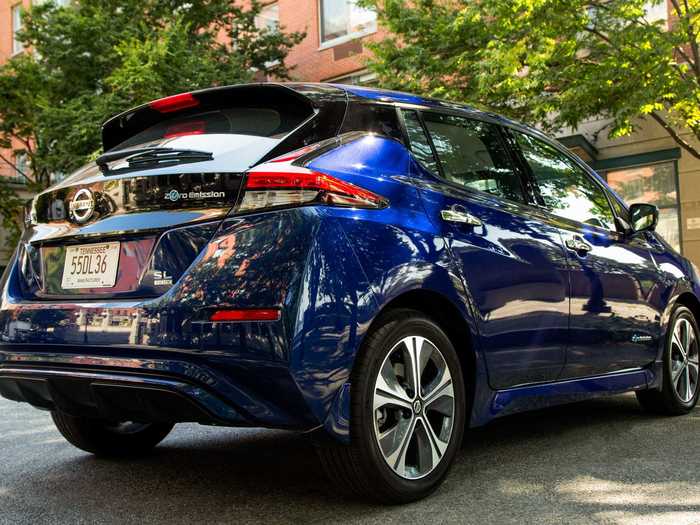
The goal when the Leaf was launched was for the Japanese automaker to embrace a "zero emission" future. It hasn't quite worked out that way, but the company is making progress, and the Leaf is still with us.
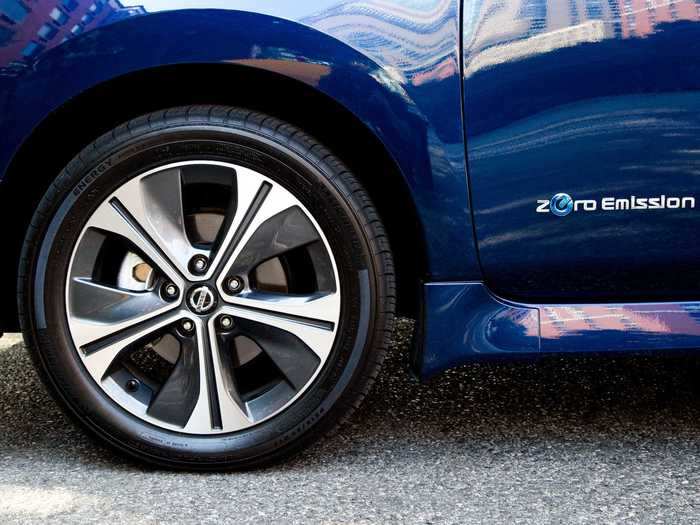
The 2019 Leaf, like the second-generation 2018 car, is much sleeker than the original. However, we're talking about a practical hatchback here, so let's not get too excited. Aerodynamics play a role in increasing EV range, so while the hatch design favors utility, the Leaf's front end has been engineered for airflow: the car has a 0.28 drag coefficient.
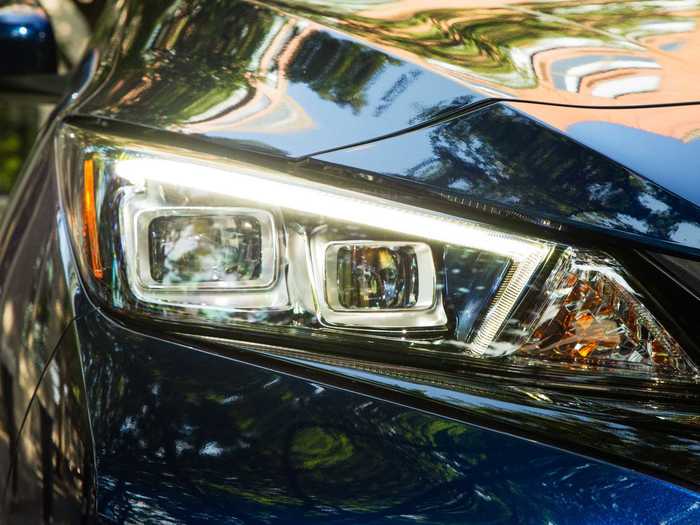
Hatchback silhouettes aren't typically associated with automotive aggression, and EVs tend to project a mostly virtuous vibe. But the Leaf's fascia is rather bold. The LED headlights are a standout feature.
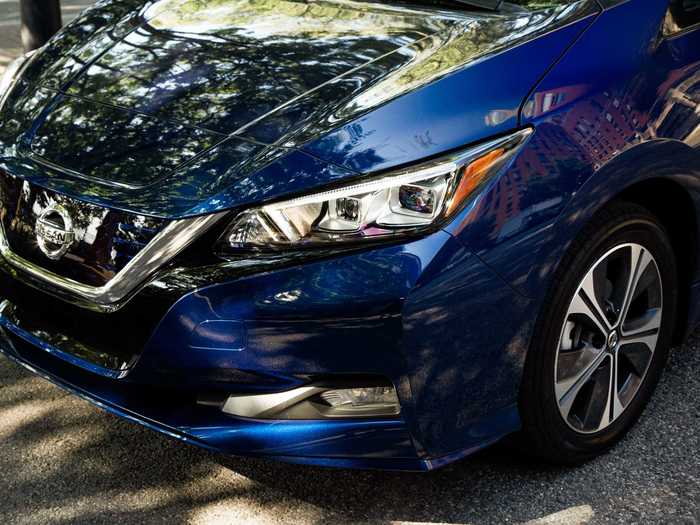
Our SL Plus trim level had a 62 kilowatt-hour battery. The larger pack adds roughly 70 miles of range compared to the standard Leaf's 151-mile battery.
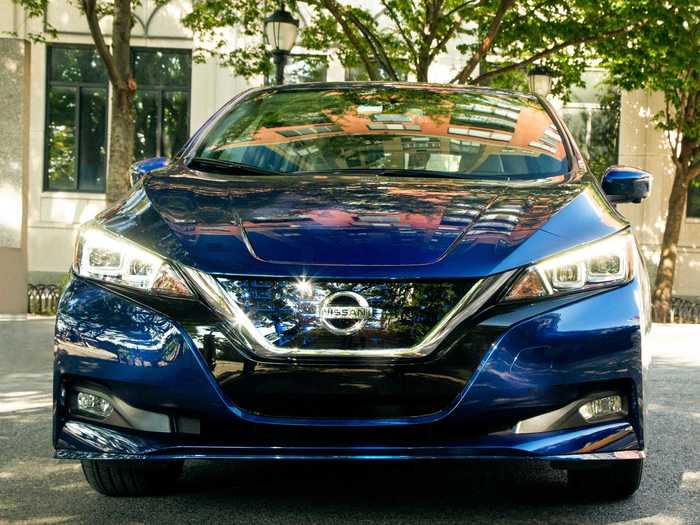
The Leaf is the top-selling EV globally, which makes sense as the car has been around since 2010. About 450,000 have been sold.
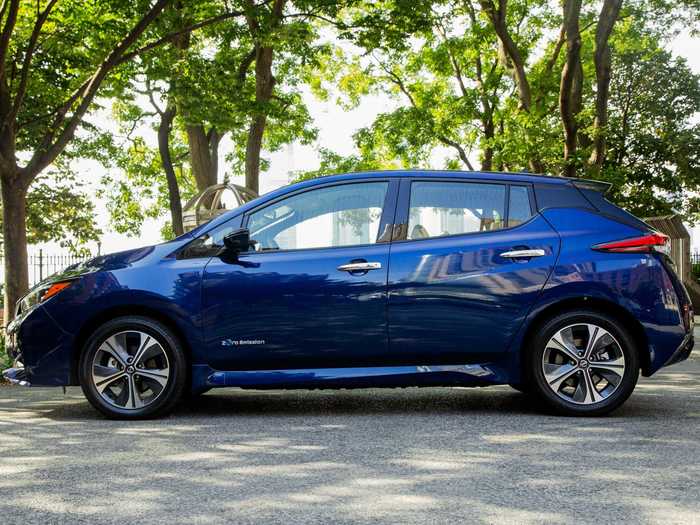
When the Leaf hit the market, Tesla was selling but one vehicle, the expensive, high-performance original Roadster. There really wasn't a good every-person's choice back than — so the Leaf filled the gap.
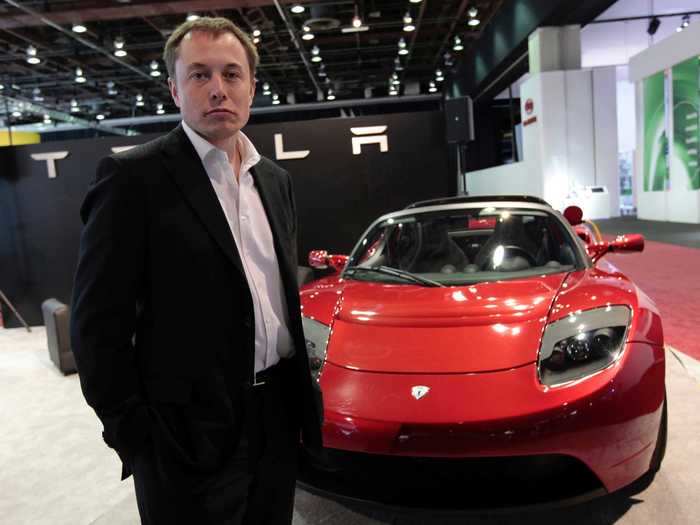
The Leaf has been on the market since 2010, making it the old man of the EV world. Nissan CEO Carlos Ghosn presided over its launch.
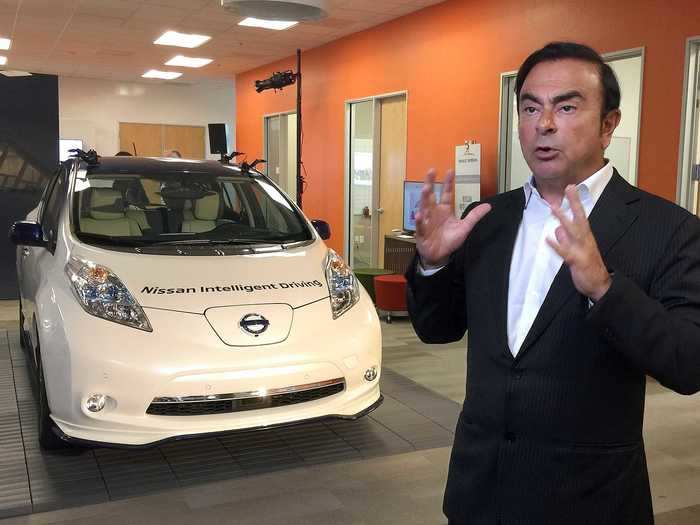
Pretty much the same Deep Pearl Blue as the Leaf that was a Business Insider Car of the Year finalist in 2018. That car had a single electric motor, producing 147 horsepower, a 40-kWh battery pack, and delivered 151 miles of range on a full charge.
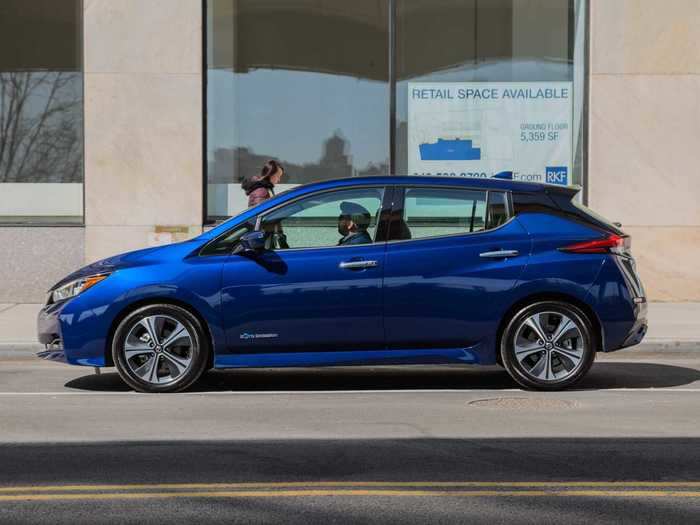
Now for the 2019 Nissan Leaf SL Plus, wearing a luminous Deep Pearl Blue paint job.
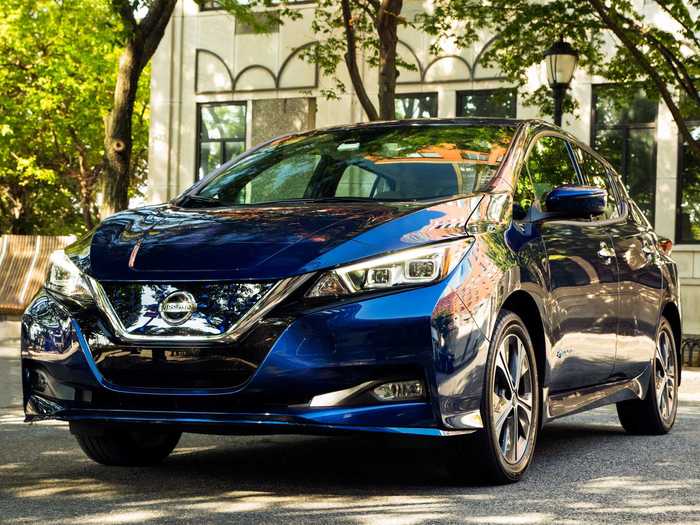
The 2020 Bolt EV is as nifty as it's always been!

The truth is that I've always been a Bolt fan, and with some extra miles added to the previous top range estimate of 238, I've even more of one. Testing the vehicles during the coronavirus pandemic — when I've been staying close to home and limiting nonessential journeys — also made it clear that 260 miles on a charge is plenty. I tried to run the Bolt down under 100 miles, but I failed. And that was during a week of evaluation. For suburbanites with access to either 120-volt or 240-volt home charging, the Bolt is an ideal EV.
The infotainment system runs on a responsive, colorful 10.2-inch touchscreen. In my tester, it was upgraded with a $595 package.
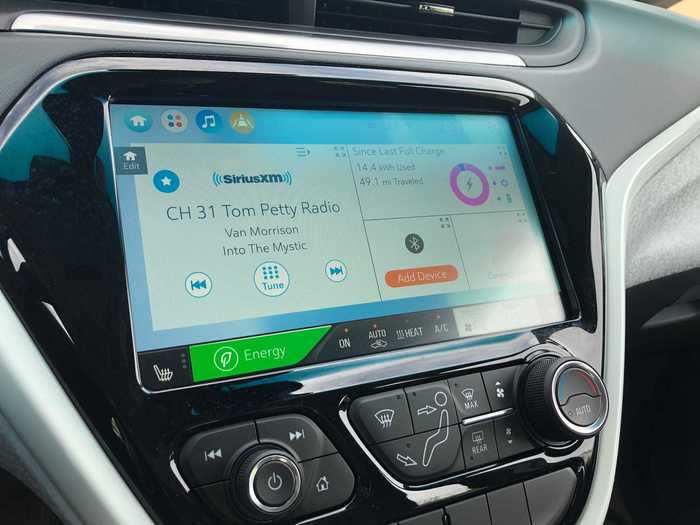
There's a suite of apps, 4G LTE Wi-Fi connectivity, Bluetooth pairing, USB ports front and rear, a premium Bose seven-speaker audio system, wireless charging, and available Apple CarPlay and Android Auto — but no GPS navigation.
The joystick shifter has a learning curve, but I got the hang of it in a hurry.
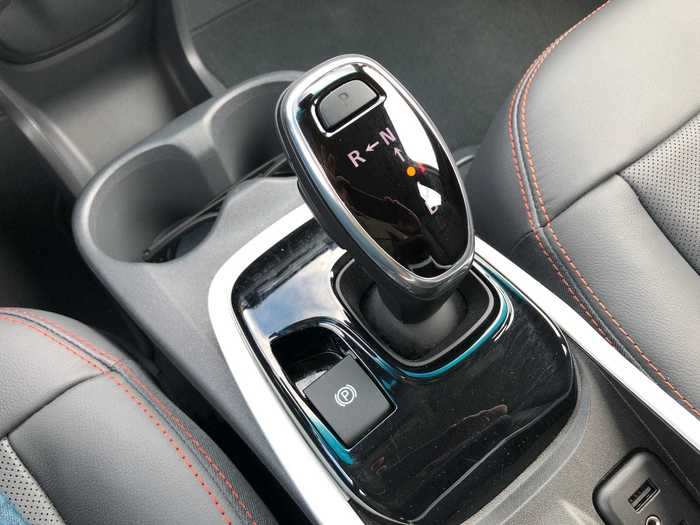
The multifunction steering wheel is nothing special, but it was heated in the Premier trim. The front seats were also heated.
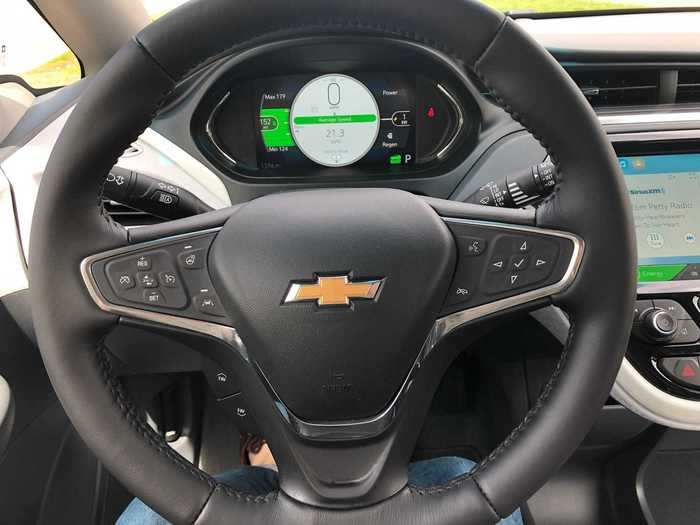
The Bolt is easily the most capacious-feeling subcompact I've ever tested.

The lack of internal-combustion components means that the Bolt has good legroom in back, for a subcompact vehicle.

The interior was "Dark Galvanized Gray." While it was far from upscale, it was comfy and pleasant.
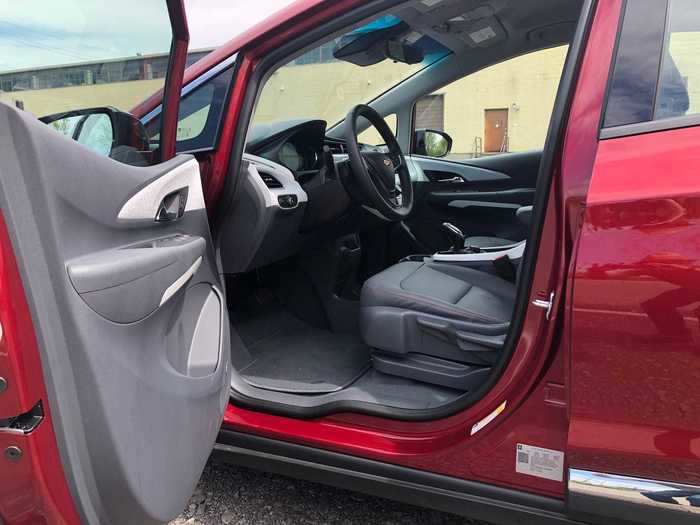
ChargePoint is widespread, but DC-fast-charging, while available, isn't as pervasive as with Tesla's Supercharger network.
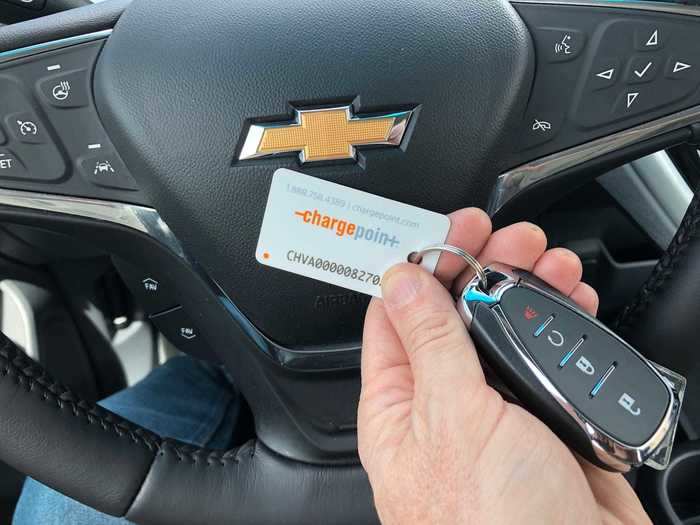
I used the ChargePoint network to top off the Bolt at a nearby Level 2 station.
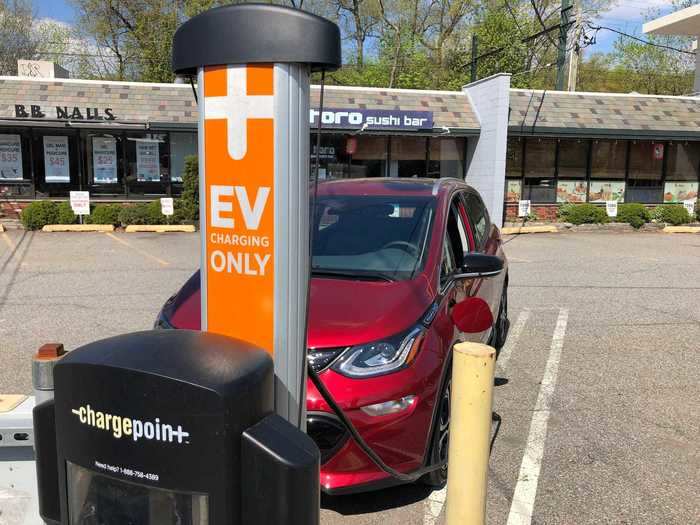
The Bolt does a good job of using regenerative braking and a regen paddle on the steering wheel to keep battery charge optimized. If you aren't hitting the freeway and taxing the battery, it's possible to putter around town for a week and still have more than 100 miles in the "tank." I ended up with 135 miles in reserve.
According to Chevy, the Bolt can return four miles each hour to the battery at 120-volt, and can get back to full in ten hours on 240-volt. A DC fast-charge returns 100 miles to the battery in 30 minutes.

There's an included charge cable, for "trickle" charging or 240-volt overnight re-juicing.

Powerplant-wise, we aren't seeing everything here — for gearheads, popping the hood on an EV can be sort of dispiriting. The Bolt's 66 kilowatt-hour battery pack is actually located under the vehicle's floorboards. The drivetrain has a single motor over the front wheels, with a single forward gear, and the total power output is a peppy 200 horsepower.

It easily swallowed two large boxes.
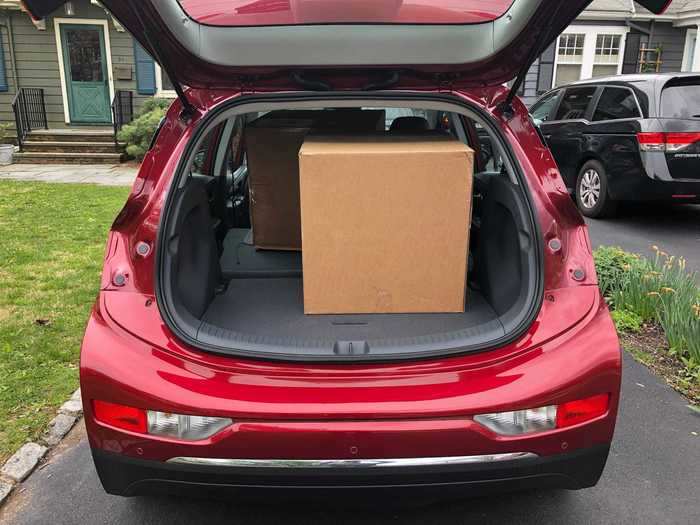
At 17 cubic feet, the Bolt's cargo hold is decently scaled. Drop the rear seats and capacity expands to 57 cubic feet.
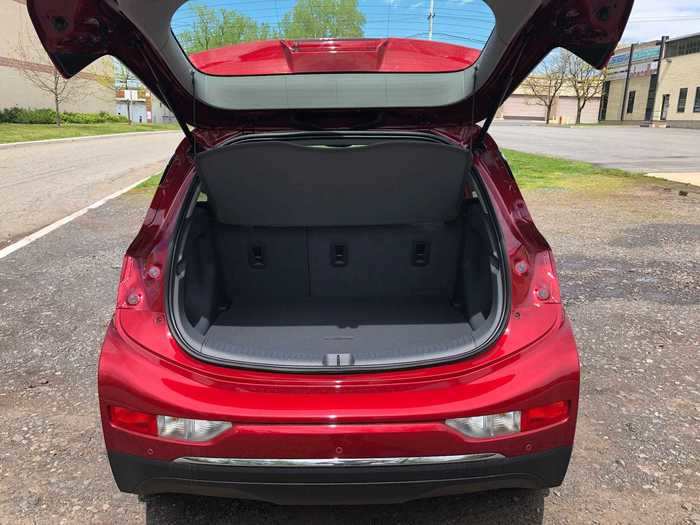
Aesthetically, the Bolt combines a fun appearance with a vibe that definitely says, "I don't cost that much."
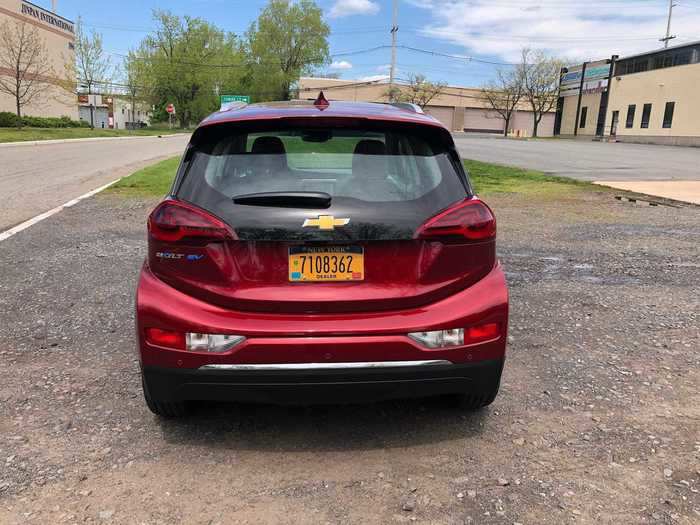
So, there no way around this: the 2020 Chevy Bolt EV Premier is a rather small vehicle. That's not a negative: the base version is $36,620, and it offers long-range, entry-level EVing in a versatile, hatchback platform.
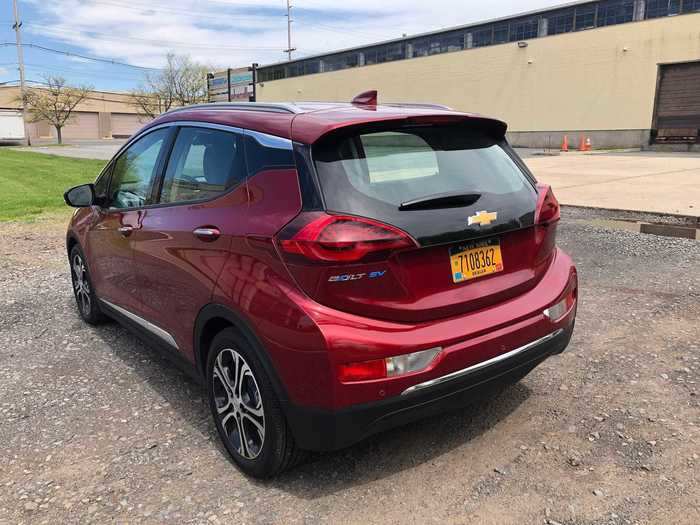
... And rear wheels were 17-inchers.
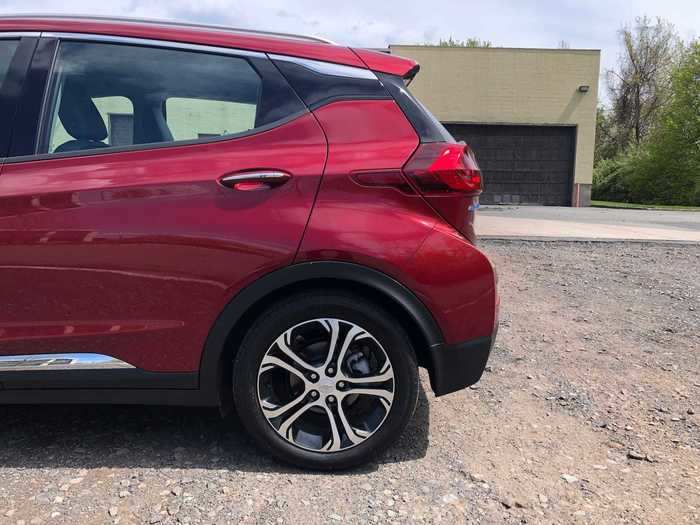
On my test car, the front ...
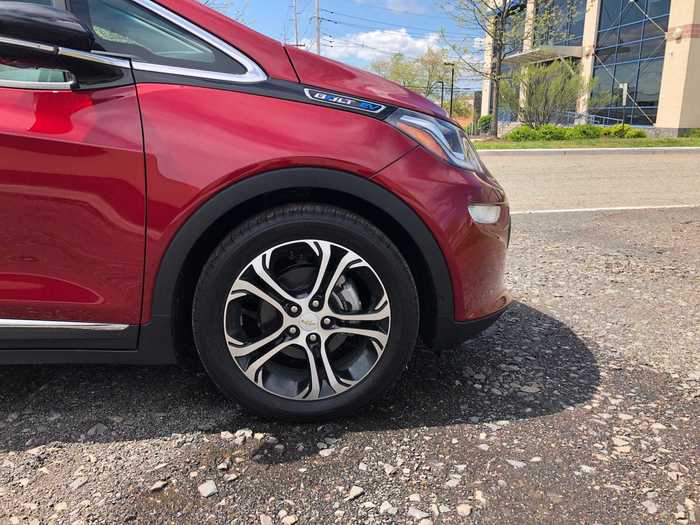
There's no internal-combustion engine, to there's no need for a grille intended for air intake. Unfortunately, this does give the Bolt's fascia a very plasticky appearance. The Bolt also gets a nice pair of HID Xenon projector headlights, plus LED running lights. The lamps are intellibeam units — they an "turn" with the car.
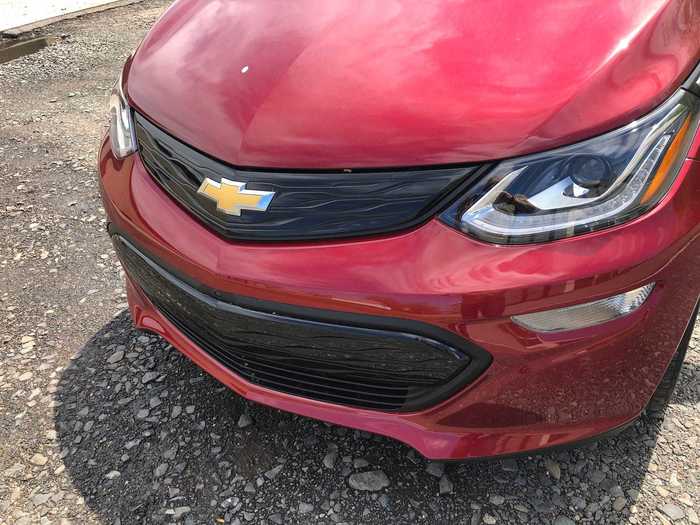
The Bolt was envisioned by the GM's Korean studio, a lab for the company's small-car platforms. Because it was engineered around its large, 60 kWh LG battery pack — which provides actual structural integrity to the car — the Bolt is distinctive within GM's global lineup.
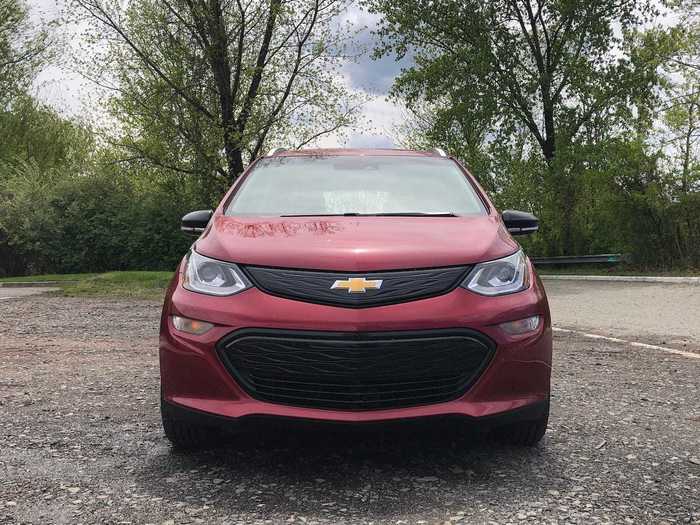
For 2020, the Bolt received more upgrades under the hood than exterior improvements. The Bolt remains a subcompact hatchback, a modest platform for such an important vehicle.
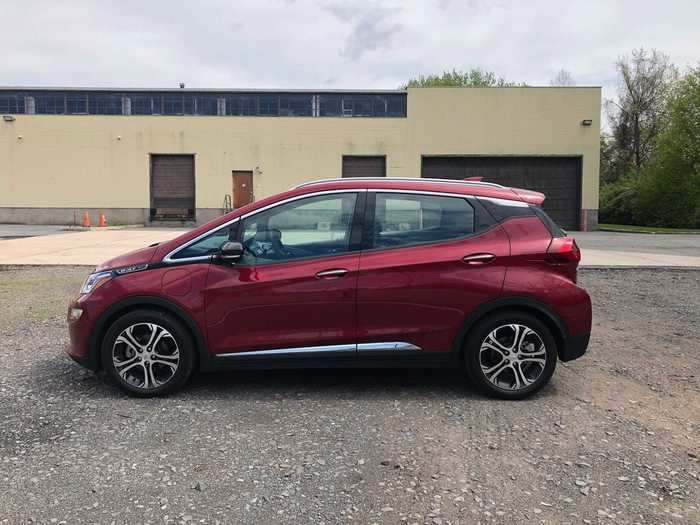
The Tesla Model 3 was officially unveiled in March of 2016, and a race was on to see which mass-market EV would hit the market first. The Bolt won, going on sale in late 2016 in a few states.
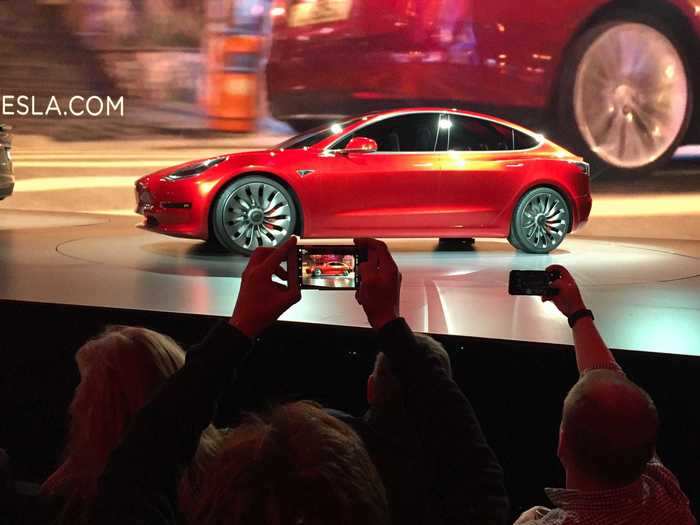
GM's top brass — President Mark Reuss, left, and CEO Mary Barra, right — rolled out the Bolt EV to much hoopla in 2015.
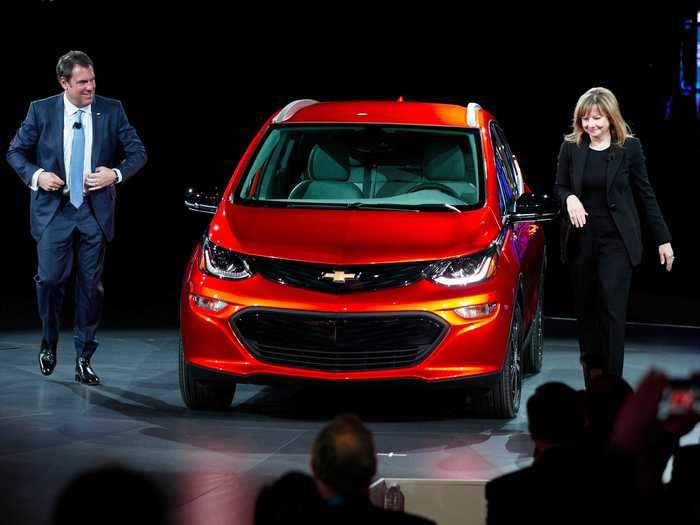
We first reviewed the Bolt in 2017, also in top-level trim, but with less range than the 2020 version and with a smaller, 60-kilowatt-hour battery pack.
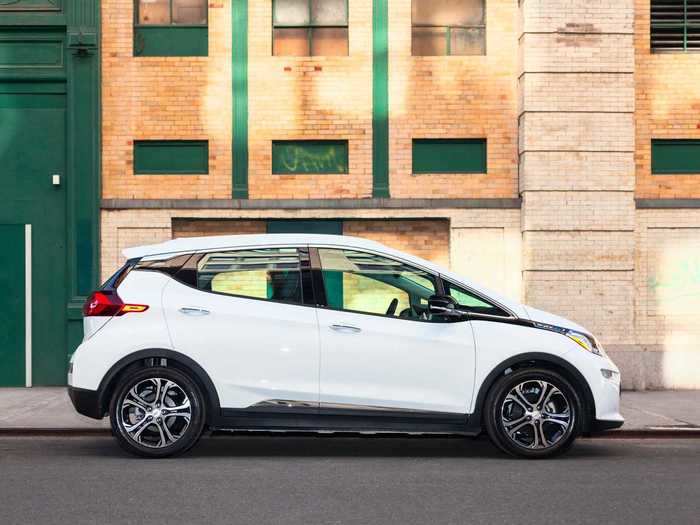
We'll commence the comparo with the 2020 Chevy Bolt EV, in Premier trim, attired in a Cajun Red Tintcoat paint job and priced, as-tested, at $44,130 (before extras, the Bolt was $41,020).
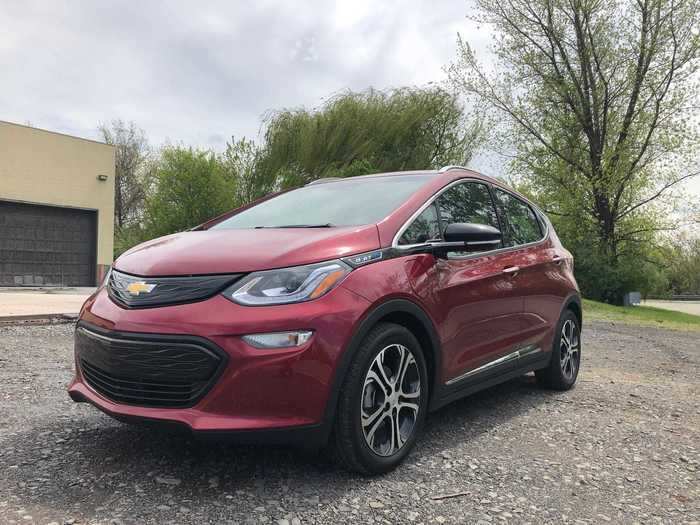
READ MORE ARTICLES ON
Popular Right Now
Popular Keywords
Advertisement